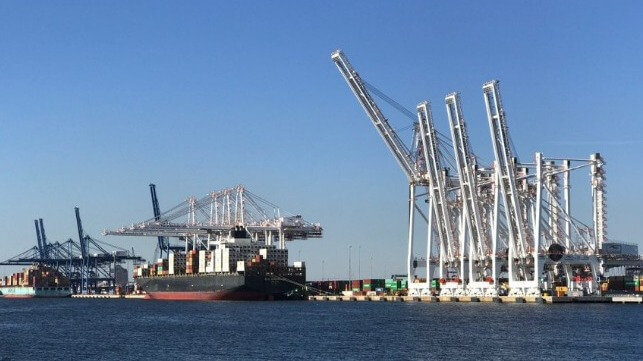China Calls U.S. Port Crane Cybersecurity Accusations “Entirely Paranoia”

China responded to the U.S. initiative on port cybersecurity and the focus on Chinese-manufactured cranes calling the premise of the initiative “entirely paranoia.” The response came from a spokesperson as opposed to a top government official, but falls back on China’s frequent position that the repeated use of the “China card” by the U.S. is “irresponsible.”
Concerns about China’s dominance in the global market for large port cranes used to load and unload containerships surfaced a year ago. There were assertions that China was tracking cargo movement and gaining vital data on the operation of ports both in the U.S. and internationally. Chinese manufacturer ZPMC dominates the market with nearly an 80 percent share and in many cases is the only supplier to more than 100 of the world’s top ports.
Speaking to reporters providing background to President Joe Biden’s Executive Order for port cyber security, Rear Admiral John Vann of the U.S. Coast Guard on Tuesday raised concerns about the design and operation of port cranes. He revealed that a survey of the cranes is already underway, with the USCG mandated by the Executive Order to provide a new Maritime Security Directive on “cyber risk management for ship-to-shore cranes manufactured by the People’s Republic of China located at U.S. commercial strategic seaports.”
“By design, these cranes may be controlled, serviced, and programmed from remote locations,” Rear Admiral Vann told reporters. He said the remote access features left the cranes and in turn U.S. ports “vulnerable to exploitation.”
Liu Pengyu, spokesperson for the Chinese Embassy in the U.S. responded to the initiative writing in a message posted on X (Twitter) “The relevant claim that ‘Chinese-made cranes pose a security risk to the U.S.’ is entirely paranoia. We firmly oppose the U.S. overstretching the concept of national security and abusing national power to obstruct normal economic and trade cooperation with China.”
The comments were backup today in the regular daily press briefing by China's Foreign Ministry Spokesperson Mao Ning. When asked about the U.S. assertions, she responded, "The accusation that China-made cranes pose security risks is completely unfounded. We firmly oppose the U.S. overstretching the concept of national security and abusing state power to go after Chinese products and companies. Weaponizing economic and trade issues will exacerbate security risks in global industrial and supply chains and inevitably backfire."
It is being widely reported incorrectly that President Biden ordered U.S. ports to replace the cranes, but the Executive Order requires them to take steps to “address several vulnerabilities that have been identified.” Last year when this issue first surfaced, members of the U.S. Congress called for disabling the remote access capabilities and sensors on the cranes.

that matters most
Get the latest maritime news delivered to your inbox daily.
The American Association of Port Authorities (AAPA) last year called the assertions “sensationalized claims,” highlighting that there was no evidence of the claims and no examples of operations being interrupted by the manipulation of the cranes. They noted that the cranes did not contain detailed information about the cargo they were moving and said there was no evidence of tracking by the cranes.
“Playing the ‘China card’ and floating the ‘China threat’ theory is irresponsible and will harm the interests of the U.S. itself,” the Chinese spokesperson said in his response to the U.S. announcement.
